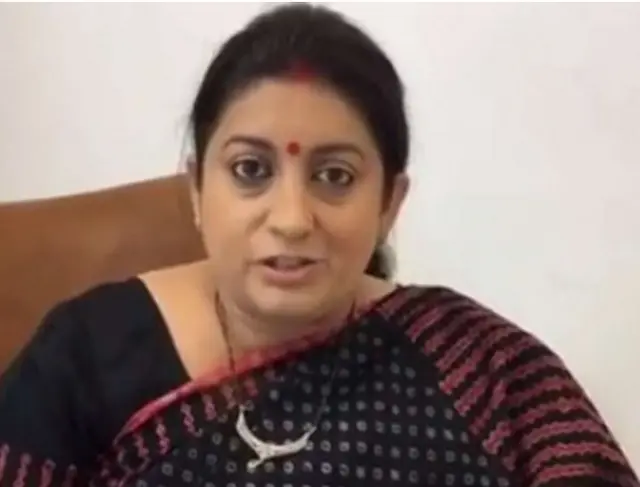When a television journalist asked Smriti Irani what qualities Prime Minister Narendra Modi saw in her to give her the education portfolio, she chose not to answer. Instead, she turned to the studio audience and repeated his question. It was enough to enrage them.
Shouting “Shame, shame”, they jumped over chairs to reach the podium and nearly assaulted the journalist. Irani then got up and rescued him from the mob’s fury.
Irani, 40, the powerful minister for human resource development overseeing education, is the queen of controversies. The TV soap star turned politician is always in the headlines for her sharp tongue and histrionics, but she’s also come under criticism for her dodgy educational qualifications and for undermining university professors.
Irani, one of Modi’s favourite ministers, is accused of Hindu-ising India’s secular but troubled education system, which is dogged by high dropout rates and universities that churn out degrees but arguably fail to prepare most of the country’s young for jobs in the rapidly growing economy. She is now writing India’s new education policy, a process that has not been taken place in three decades.
At a meeting of 42 heads of universities in February outside New Delhi, reports said that Irani told them to come out of their “comfortable cocoons”. She also scolded two for dozing and threw out a professor who tried to take her photograph.
“She has proved disastrous as education minister, a dangerous combination of arrogance and ignorance,” said Ramachandra Guha, a political historian. “She has further undermined the already-fragile autonomy that our best universities had. Her contempt for scholars and scientists is in line with the overall anti-intellectual theme of this government.”
Irani is perhaps the most-trolled minister in Modi’s cabinet, and she frequently engages in Twitter spats with opponents. Critics call her a “drama queen” and “aunty national” for her high-pitched sermons on nationalism.
In the 2014 national parliamentary election, Irani lost to Rahul Gandhi, the heir apparent of the opposition Congress party. Modi introduced her as his sister to voters.
When Modi appointed her to his cabinet, opponents argued that she had never attended college. She defended herself, stirring a bigger storm.
“I do have a degree from Yale, as well, which I can bring out and show how Yale celebrated my leadership capacity,” Irani said.
It turned out that she had attended a week-long leadership program at Yale in 2013. She was lampooned for days.
More recently, she made a spelling mistake in a tweet – “Governer” instead of “Governor” - and trolls descended again.
But she wears all such criticism like a badge. She sarcastically refers to herself as “illiterate”.
At the heart of all the attention are two questions: How do Indians respond to the speedy rise of women politicians, and is Irani right for the job?
“I am not a political Cinderella. I don’t need to be rescued. If I feel insulted, I stand up and speak for myself,” Irani said in an interview with the Times of India last year.
Since she took office two years ago, three heads of colleges and universities have been forced to quit before their terms ended.
Sushanta Dattagupta, who was sacked this year as vice-chancellor of a university, said that an education minister should have a vision and an appreciation of heterogeneity, and must regard universities as places for progressive ideas. “I did not discern any of these attributes in Mrs Irani,” he said.
Irani said that Dattagupta was corrupt, a charge he refutes.
But there are many who say she is doing a good job.
A lawmaker with the ruling Bharatiya Janata Party (BJP), Kunwar Bhartendu Singh, recently took the head of a university to meet her to request funds.
“She had all the facts on her fingertips,” said Singh. “She never looked at her file even once. Either she is a genius or she has a phenomenal memory.”
Irani has earned praise for making it easy for students to attend technical institutes and formal school, setting up a national ranking for colleges, easing the norms for universities to invite foreign faculty and promoting online courses. She also announced maternity and childcare benefits for women pursuing PhDs.
Some say Irani routinely consults with Hindu-nationalist academic and student groups. She has promoted Sanskrit and yoga in schools and colleges, and has appointed Hindu nationalists to head historical research, national book trusts and libraries.
“Our textbooks should celebrate the ancient knowledge contained in our ancient scriptures, the Vedas,” said Atul Kothari of Save the Education Movement, which had called for a ban on a book by US scholar Wendy Doniger over claims that it insulted Hinduism. His group has met with Irani three times for consultations.
A professor at Delhi University said that “the bureaucrats in her ministry have stopped interacting with liberal academics”.
Many now fear that the new education policy will include Hindu-supremacist ideas in curricula and on campuses.
Irani was born in a middle-class home in New Delhi and moved to the entertainment city of Mumbai after school. For years, she was India’s darling daughter-in-law for her role on the longest-running blockbuster Hindi television soap opera, Because a Mother-in-Law Was Once a Daughter-in-Law, Too. She joined the Hindu-nationalist BJP in 2003. Later, she became the party spokeswoman and a member of the upper house of Parliament.
But many continued to view her as a television star. A Congress party member even called her a “dancing-singing woman” on national television, a derogatory remark in India.
(THE WASHINGTON POST)
 简体中文
简体中文



